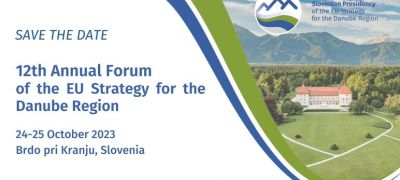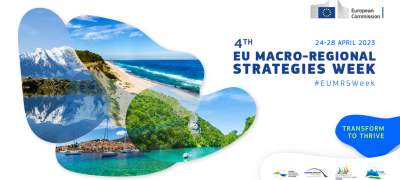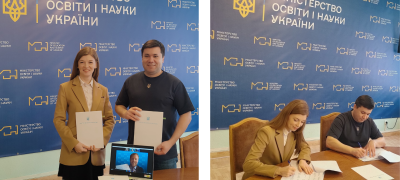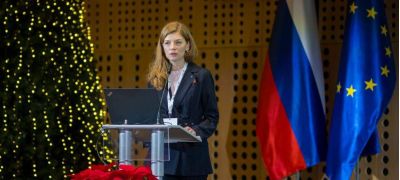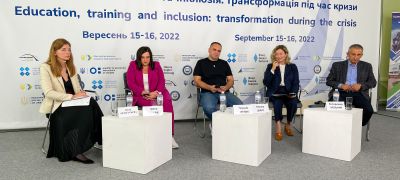EU Strategy for the Danube Region
- Home
- Directions
- Danube Region Strategy
The EU Strategy for the Danube Region (EUSDR) is one of the four EU macro-regional strategies aimed at strengthening transnational cooperation in the region in order to overcome imbalances in its socio-economic development, unite and coordinate the efforts of all participants to implement joint projects.
Within the framework of the EUSDR, non-EU countries cooperate on equal terms with EU member states in 12 priority areas, which contributes to greater cohesion of the Danube macro-region and acceleration of European integration processes.
Participants:
-
-
EU Member States: Austria, Bulgaria, Croatia, Czech Republic, Germany, Romania, Slovakia, Slovenia, and Hungary
-
EU Candidate countries: Bosnia and Herzegovina, Serbia, Montenegro, Ukraine, Moldova
-
The Danube Region Strategy addresses a wide range of issues; these are divided among 4 pillars and 12 priority areas. Each priority area is managed by two countries as Priority Area Coordinators (PACs). To find out more about the role of PACs, please see Governance. Read here the Annual Progress Reports for each Priority Area.
Learn more about the roles and responsbilities of the main actors of the Strategy, also in the EUSDR Governance Architecture Paper, officially endorsed by National Coordinators in July 2020.
The European Commission, as the executive of the EU, prepared the Strategy in 2010 in consultation with all partner countries. The Commission´s Directorate General for Regional Policy helps to implement the Strategy by facilitating and supporting actions of the participating countries. They also coordinate the Strategy at the policy level, assisted by a High Level Group.
The High Level Group (HLG) on macro-regional strategies is made up of official representatives from all EU Member States. It assists the Commission in the policy coordination of the Strategy. The Commission consults the HLG for modifications to the Strategy and the action plan, as well as for reports and monitoring. The HLG also addresses policy orientation and prioritisation.
Each Priority Area is jointly coordinated by two participating countries (or regions), who work in consultation with the Commission, relevant EU agencies and regional bodies. For each Priority Area, each of the two responsible countries designates a Priority Area Coordinator.
The Priority Area Coordinators (PACs) are leading the Steering Groups, which are the expert drivers of a day-to-day implementation. The Steering Groups, with members from all involved countries, are established for all priority areas. Their role, capacities, resources and engagement is key to success. The PACs, together with the Steering Groups, ensure the implementation of the EUSDR (e.g. by agreeing on planning, with targets, indicators and timetables, and by ensuring wide contacts between project promoters, programmes and funding sources, and by providing technical assistance and advice). Their work is trans-national, inter-sectorial and inter-institutional. PACs and Steering Groups also support the reporting and evaluation of the EUSDR – they identify progress related to the improvements that the actions and projects deliver and achievement of targets. They also regularly provide information/reports on their work.
You can find the list of PACs along with their contact information on the Contact PACs page.
The National Coordinators (NCs) are the core strategic body within the governance structure. They have a strategic coordination function within their national or regional government. The NCs coordinate and keep an overview of the participation of their country in the implementation of the EUSDR including all 12 Priority Areas (PAs). They also promote the EUSDR and inform at the national and regional level all the relevant stakeholders of key developments, ongoing initiatives, including alignment of policies and funding. NCs meetings are chaired by the country holding the rotating Presidency, which also prepares and organises them with the support of the EUSDR Trio Presidency, the European Commission (EC) and the Danube Strategy Point (DSP).
NCs are actively involved in the DRP Monitoring Committee’s discussions/decisions. The involvement takes place in one of the following ways: as a full member of the DRP Monitoring Committee (MC), an observer, a member of a national delegation or through involvement of national committees or other formal/informal joint procedures prior to the MC meetings.
You can find the list of NCs along with their contact information on the Contact NCs page.
The Danube Strategy Point (DSP) has been established in 2015 to improve the implementation process of the Strategy, supporting the Commission in its coordination tasks of the EUSDR. The DSP is supporting exchange among Priority Area Coordinators and National Coordinators in their tasks and promotes the Strategy predominantly at the European level. The DSP functioning until 2017 administered funds originating from the EU institutions in the framework of Technical Assistance for the Priority Areas in the EUSDR for the years 2015-2016.
Read more on the EUSDR website.
The implementation of projects under the Strategy can be financed from the existing technical assistance programmes of the EU and international financial organisations, as well as from national budgets. For more information on funding opportunities, please follow the link.
- EU Strategy for the Danube Region: https://danube-region.eu/
- Ukrainain EUSDR Presidency Facebook page: https://www.facebook.com/UAPresidency
- Danube Strategy Point: https://danube-region.eu/contact/danube-strategy-point/
- Priority Area 9 People and Skills: https://peopleandskills.danube-region.eu
- Danube Regional Programme official website: http://www.interreg-danube.eu/
- Steering Group members: https://danube-region.eu/contact/steering-group-members/
- EUSDR Priority Area Coordinators: https://danube-region.eu/contact/priority-area-coordinators/
- Directorate-General Regional and Urban Policy
Participation of Ukraine
Coordination of Priority Area 9 →
Ukraine became the first non-EU country to hold the Presidency of the EU Strategy for the Danube Region from 1 November 2021 to 31 October 2022. Since 2020, Ukraine has been coordinating EUSDR Priority Area 9 "People and skills" of the Strategy together with Austria and Moldova.
4 oblasts are involved in the implementation of the EUSDR, which are partially located in the Danube River basin:
Odesa (has direct access to the Kiliya estuary of the Danube River; part of the Danube Delta sub-basin is located on its territory)
Ivano-Frankivsk and Chernivtsi (the source of the Prut and Seret rivers, which are the left tributaries of the Danube, are located on the territory of the regions)
Zakarpattia (located in the basin of the Tisza River, a left tributary of the Danube).
Programme of Ukraine’s Presidency in the European Union Strategy for the Danube Region can be found here.
This Programme contains political and thematic priorities. Ukraine identified as its central priorities:
- Sustainable Development of the Danube Region: Decarbonisation and Transformation of the Economy
- Development of human capital and labour markets
Political priorities were:
- Harmonization of EUSDR priorities, implementation, and evaluation
- Enhancing the institutional capacity of the EUSDR
- Strengthening the role of civil society in the implementation of the EUSDR
News

Contact us
-
+380 50 424 85 24


